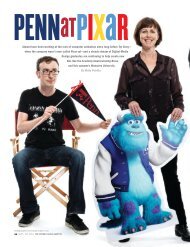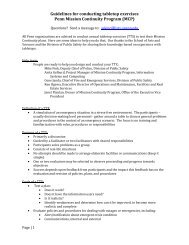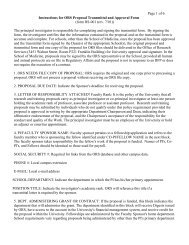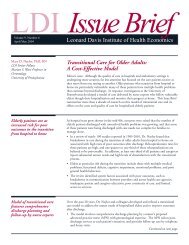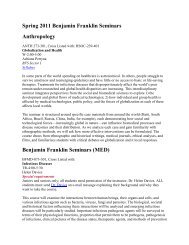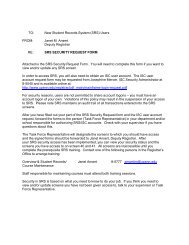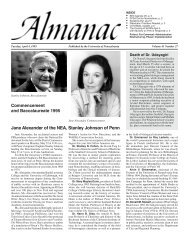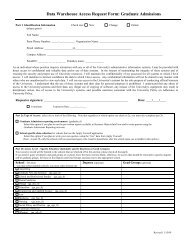No. 3 September 13, 1994 - University of Pennsylvania
No. 3 September 13, 1994 - University of Pennsylvania
No. 3 September 13, 1994 - University of Pennsylvania
- No tags were found...
Create successful ePaper yourself
Turn your PDF publications into a flip-book with our unique Google optimized e-Paper software.
President Rodin onAdministrative Restructuring...page 8INSIDE• Speaking Out: On the Death <strong>of</strong> aStudent in the Neighborhood, pp. 2-3PPSA <strong>1994</strong>-95 Open Meetings, p. 3• Calls for Input: Honorary Degree <strong>No</strong>minations;Faculty Work for an Inaugural Collection, p. 3Freshman Convocation, pp. 4-6• Support for Cancer Caregivers; BrainstormingHIV/AIDS Awareness, p. 6CrimeStats, Update, Bulletins, p.7• Benchmarks: Reinvesting in Penn:Administrative Restructuring(Rodin), p. 8Tuesday, <strong>September</strong> <strong>13</strong>, <strong>1994</strong> Published by the <strong>University</strong> <strong>of</strong> <strong>Pennsylvania</strong>Volume 41 Number 3Almanac <strong>September</strong> <strong>13</strong>, <strong>1994</strong>Remembering Al-Moez AlimohamedOn Monday night, August 29, Al-Moez Alimohamed,a graduate student in the MathematicsDepartment at Penn, was robbed and killed at 47thand Pine Streets. All <strong>of</strong> Moez’ friends are shocked,outraged, and deeply grieved by this tragic and devastatingloss. It is still hard to accept that he will notbe among us this year.Moez was a citizen<strong>of</strong> Pakistan, born onFebruary 14, 1967 inManila, the Philippines,to Iqbal and BilqueeceAlimohamed. Because<strong>of</strong> his father’s internationalcareer, initiallyin banking and laterwith the United Nations,Moez, together with hisyounger brother Faroukand sister Natasha, wasbrought up and went toschool in many regions<strong>of</strong> the world: SaudiArabia, Pakistan, Nigeria, Zaire, the United States,Switzerland, Malaysia, and Japan.During his undergraduate education he spenthis freshman year at Tufts <strong>University</strong> and receivedhis B.A. in mathematics after 4 years from ReedCollege in Portland, Oregon. He was a graduatestudent and Teaching Assistant for one year atPortland State <strong>University</strong> and then transferred tothe <strong>University</strong> <strong>of</strong> <strong>Pennsylvania</strong> in 1990 to enterour Ph.D. program in Mathematics.Moez was a dedicated student, but also fun-loving.He was friendly and outgoing and had manyfriends among the graduate students, not only inMathematics but also in the Physics and Computerand Information Science Departments. It was sucha pleasure seeing him develop during his severalyears at Penn.During his first years, Moez was a Teaching Assistant.He was enormously successful as a teacher.Even at this early stage, Moez exhibited a compellingability to attract students to the subject. As a TeachingAssistant in Calculus courses, he <strong>of</strong>ten receiveddepartmental good teaching awards in recognitionfor his excellent teaching, which students describedas “engaging”, “very effective” and “inspiring”. Thelast two summers, Moez independently taught sections<strong>of</strong> the Ideas in Mathematics course. He usedan innovative pedagogical style and developed much<strong>of</strong> his own material for the course.In May 1993 Moez passed his oral qualifyingexam, the last formal requirement before mathematicsstudents start on their research work. In July1993 Moez was invited to participate in the highlycompetitive International Summer School in Logicfor Computer Science, held in Chambery, France andsponsored by the European Union. Subsequently, hestarted working toward a dissertation. Moez’ researchwas in mathematical foundations <strong>of</strong> programmingstructures, an area that spans mathematical logicand theoretical computer science.During the past yearhis work went particularlywell. In recognition <strong>of</strong> hispromising research proposalhe recently receiveda prestigious GraduateFellowship from the Institutefor Research and CognitiveScience, sponsoredby the National ScienceFoundation. This fellowshipwould have enabledhim to concentrate on hisresearch during the currentacademic year. Moezworked assiduously overthe summer and finishedwriting up his first research paper, which he wasabout to submit to a leading research conferenceto be held in Edinburgh, Scotland in April 1995. Atentatively final version <strong>of</strong> the paper was printedout a few days before Moez’ death.Moez was on the verge <strong>of</strong> being recognized nationallyand internationally for his outstanding results. Hispaper is likely to become a standard reference in thesubject. He was scheduled to give a talk on his workin the Penn Logic and Computation Seminar thismonth. Moez also received an invitation to presenta talk at the <strong>No</strong>rth American Jumelage Conferenceon Type Systems in Ottawa, Canada on October 10.This would have been Moez’ first international conferencepresentation. Moez was, despite his talent, avery modest person and would not have boasted <strong>of</strong>these early recognitions <strong>of</strong> his accomplishments, buthe was clearly proud <strong>of</strong> them.Moez would have received his Ph.D. duringthe current academic year and then would likelyhave applied for a postdoctoral research positionat an American, Canadian, or European university.He was well on his way to becoming a successfulresearch mathematician and an outstandingteacher. He will be sorely missed by all <strong>of</strong> us, buthis contributions, as well as his warm personality,will long be remembered.— Dennis DeTurck, Pr<strong>of</strong>essor <strong>of</strong> Mathematicsand Undergraduate Group Chairman— Andre Scedrov, Pr<strong>of</strong>essor <strong>of</strong> Mathematics/Computer and Information Science, andthesis advisor <strong>of</strong> Moez Alimohamed— Wolfgang Ziller, Pr<strong>of</strong>essor <strong>of</strong> Mathematicsand Graduate Group ChairmanArraignment in MurderAt a <strong>September</strong> 28 hearing for thefive teenagers arrested in the death <strong>of</strong>Al-Moez Alimohamed, Assistant DistrictAttorney Roger King is expectedto seek arraignment on charges <strong>of</strong>murder, robbery, theft, receiving stolenproperty, violation <strong>of</strong> the Uniform FirearmsAct,possession <strong>of</strong> an instrument<strong>of</strong> crime, and conspiracy.Plainclothes police were momentsfrom the scene in the 4700 block <strong>of</strong> PineStreet where the five allegedly beat Mr.Alimohamed and robbed him <strong>of</strong> less than$5 before one shot him with a sawed-<strong>of</strong>fshotgun. The <strong>of</strong>ficers arrested the armedman and one other immediately, and twomore were apprehended nearby; the fifthturned himself in later.The youths are Antoine Saunders,18; Khaalis Edmonson and GregoryPennington, both 16; and AntonyArcher and Ollie Taylor, both 15, allfrom blocks west <strong>of</strong> 52nd Street nearSpringfield Avenue. All five will betried as adults, the D.A.’s Office said.In Recovery: Samir Shah, a 21-year-old undergraduate shot in the abdomenin an attempted robbery in the 3900block <strong>of</strong> Pine Street on August 14, wasreleased from the hospital <strong>September</strong> 6.<strong>No</strong> arrests have been made in the assaulton Mr. Shah and his housemate.Security Systems:Christopher AlgardPublic Safety Commissioner JohnKuprevich has named ChristopherD. Algard, a former DuPont securityspecialist, to the newly created position<strong>of</strong> Director <strong>of</strong> Security Services forPenn’s Division <strong>of</strong> Public Safety. Mr.Algard joined the staff last week after19 years with E.I. DuPont de Nemoursand Company <strong>of</strong> Wilmington, where heserved as corporate security strategictechnical supervisor-manager.At Penn, Mr. Algard will be responsiblefor the overall design <strong>of</strong>security principles, for overseeing thedevelopment <strong>of</strong> security projects, andfor the integration<strong>of</strong> securitytechnology withcurrent systems.He will alsooversee the development<strong>of</strong>the Public Safetyaccess control/alarm monitoringsystem.
<strong>No</strong> Time for CoolThis is a letter in reaction to, and an invitationto discuss, the murder <strong>of</strong> Al-MoezAlimohamed.We know that when something makesus terrifically angry we very <strong>of</strong>ten need towait and cool <strong>of</strong>f before reacting. But I don’twant to be cool in reacting to the murder <strong>of</strong>Al-Moez Alimohamed. Cooling <strong>of</strong>f meansforgetting about it, resuming business asusual. Cooling <strong>of</strong>f means consigning thisman to crime statistics. Cooling <strong>of</strong>f meansshrugging and saying, “That’s the way thingsare nowadays. What can we do?”But we all need to actively face violencearound Penn (and not only around Penn). Itis changing us for the worse. You can seeand hear it every day.A woman I ride with on a van to Penn:“I would never take public transportation towork—it’s just not safe.” I wanted to arguewith her, but I’ve been hassled for money onthe subway. A man was killed a few monthsago at my stop at 37th and Spruce. So I said,weakly, it’s OK if you travel at rush hour.A co-worker who has moved to thesuburbs with his children because “My kidscould get killed in a West Philly school.”My roommate robbed at knifepoint at ourdoorstep when we used to live in West Philly(yes—I’ve fled with my family also): “I waslucky.” He left it understood, quite rationally,that he meant that he wasn’t killed, but withme also thinking he was insane.The man who took my ticket at the 40thStreet movie theater just before it went out<strong>of</strong> business telling me that the theater wasn’tdoing well financially, and “There is also aproblem with these kids—you know.”An employee at the Italian Bistro—nowclosed—saying that, yeah, there were financialproblems, but it was also the crimein the area. We know about crime drivingother neighborhood stores away, but crimein a restaurant? Pretty ridiculous, except <strong>of</strong>course that Salad Alley and Boccie (remoteplaces obviously not safe) were robbed atgunpoint (shots in the air were fired so thepatrons would know the punks were serious).And yeah, someone was shot (was it stabbed?who can remember?) outside Allegro Pizzaa couple <strong>of</strong> months back, which can hardlycompete with all the shootings, studentsincluded, around McDonald’s.My memory fails me. When was the CGSstudent robbed, raped and shot by a man whoabducted her when she was getting into hercar way out at 34th and Chestnut? Was thatjust last year? These things blur together. Howmany years ago was the student stabbed todeath in Grad Towers during Thanksgivingbreak? I think it was the same year I gotpunched in the chest by a homeless man forsaying “sorry” when he asked for change.“You’re not sorry,” he said. Would it havehelped if I told him I volunteered at a homelessshelter?Yeah, my memory for these things, andSpeaking Outwill to deny, is pretty strong. That’s why Isometimes clip things out <strong>of</strong> newspapers,like the headline in the D.P. March 21, <strong>1994</strong>,“Seven students robbed at gunpoint”—overone weekend. It’s these kinds <strong>of</strong> things thatcounter the nonsense that one West Phillyresident, in denial, tells me: “the perception<strong>of</strong> crime around here is much worse than thereality.” A superior view, don’t you think? Let’snot be hustled by all this false perception.I wonder how the <strong>University</strong> communitywould have thought <strong>of</strong> seven gunpoint robberiesover one weekend thirty years ago. Youknow, back before the escort shuttle service.My own wife, who works as a socialworker in the worst parts <strong>of</strong> <strong>No</strong>rth Philly,saying about Al-Moez, “It was 11:30, heshouldn’t have been out so late.” 11:30late? For a grad student? How much didthis make him culpable for what happenedto him? Will we be soon saying, “He livedpast 42nd Street; he should have knownbetter. And it was after 5 p.m.”Please, let us not normalize ourselves tothis insanity. We are losing our freedom, oursense <strong>of</strong> community, our trust, our development,and sometimes our health or very lives.And the lives <strong>of</strong> our loved ones. What are wedoing about it?—Barry Kirzner, W ’85Computer Specialist, Wharton AccountingFrom the PresidentBarry Kirzner’s letter eloquently expressedthe anger and dismay that we allfeel about the tragic murder <strong>of</strong> Al-MoezAlimohamed. This terrible incident troublesus deeply. His death was a tragedy, not justfor his family and friends, but for the entirePenn community. We have all been touchedby it because, as Mr. Kirzner said, Al-Moezcould have been any one <strong>of</strong> us. And despitethe best efforts <strong>of</strong> so many people at Penn, andthe cooperation <strong>of</strong> their counterparts with thecity, there is no quick solution to the problems<strong>of</strong> random violence in our community.There are things we have done. We respondedimmediately by meeting with theleadership <strong>of</strong> the city government and thepolice department. We requested increaseduniformed patrols on all shifts. The 18thprecinct, which is the area that surroundsthe <strong>University</strong>, has as a result escalated thenumber <strong>of</strong> both foot patrols and tacticalsquads. In addition, I have directed oursenior management team to conduct a fullreview and develop a master plan for publicsafety at Penn, about which we will all hearmore in the weeks ahead.We can and must make the safety <strong>of</strong> ourstudents, faculty and staff the paramountresponsibility <strong>of</strong> Penn’s leadership. I want toassure Mr. Kirzner and all <strong>of</strong> you that I acceptthat obligation. The Penn community mustbe assured that we will continue to increaseour resources, our vigilance and our efforts topromote safety. This is not the place to enumerateall that is being done—though the factthat Penn’s public safety budget increased 30percent over the past three years and that morethan 80 police personnel are assigned to patrolthe <strong>University</strong> community around the clockshould serve not to make us complacent but asevidence <strong>of</strong> the serious efforts underway. Letus also be mindful <strong>of</strong> the fact that collaborativeefforts <strong>of</strong> Penn, other institutions and individualsto revitalize the economic well-being <strong>of</strong>the area are underway, and Penn is committedto these initiatives. We will also be taking avigorous look at the scope and dimensions<strong>of</strong> these and other possible activities over thenext several months.Finally, we must continue to talk openlyabout this issue. Mr. Kirzner’s blunt letter waspainful. But what has happened and what wefeel is deep pain. As a parent with a familywho will all be living and working in WestPhiladelphia I share these feelings, even as Ihave made my commitment to this communitythat is so important to Penn. Let us not hidefrom these problems, or deceive ourselvesabout their complexity, or deny the emotionsthat have been evoked. And let us continueto do all within our power to make the Penncommunity as safe as possible for all <strong>of</strong> us.<strong>No</strong>thing is more important than securityat Penn, for without a sense <strong>of</strong> well-being,an academic community cannot flourish.— Judith Rodin, PresidentThe following was received too late toallow the President time to respond in thisissue, but she expects to address thequestions here next week.—Ed.‘‘A Greater Urgency”Dear President Rodin:The fatal shooting <strong>of</strong> Al-Moez Alimohamedin the 4700 block <strong>of</strong> Pine Streetcalls urgent attention to the reason PFSNIwas established two years ago—to makethe revitalization <strong>of</strong> West Philadelphia, and<strong>University</strong> City in particular, the highestpriority <strong>of</strong> the <strong>University</strong> <strong>of</strong> <strong>Pennsylvania</strong>.Mr. Alimohamed’s violent death illustratestragically the highly dangerous conditions <strong>of</strong>the neighborhoods west <strong>of</strong> 40th Street, conditionsthat spill onto the Penn campus withalarming regularity and diminish the spirit,confidence, and vitality <strong>of</strong> the <strong>University</strong>.More police cars, escort vans, and blue-lighttelephones—while undeniably necessaryunder current conditions—are not the answerto <strong>University</strong> City’s security problems. Thesolution, we believe, lies in investment—adecisive, strategic financial involvement andengagement <strong>of</strong> academic resources to assistthe revitalization <strong>of</strong> West Philadelphia. Thatthe West Philadelphia youths who have beencharged in the murder <strong>of</strong> Mr. Alimohamedare residents <strong>of</strong> an area outside the traditionalboundaries <strong>of</strong> <strong>University</strong> City underscores, inour judgment, the need for a major communityrevitalization effort that includes, but extendswell beyond, the <strong>University</strong>’s immediategeographic area. (continued next page)Speaking Out welcomes reader contributions. Short timely letters on Unviersity issues can be acceptedThursday noon for the following Tuesday’s issue, subject to right-<strong>of</strong>-reply guidlines.Advance notice <strong>of</strong> intention to submit is appreciated.—Ed.Almanac <strong>September</strong> <strong>13</strong>, <strong>1994</strong>
PFSNI’s letter <strong>of</strong> 24 February <strong>1994</strong>contained the following jeremiad, whichwe believe has far greater urgency now, inlight <strong>of</strong> last week’s tragedy:Indications <strong>of</strong> rapid decline are everywhere.More houses go on the market weekly asresidents attempt to flee. The trash pilesup along the sidewalks as a grim reminder<strong>of</strong> the aborted Special Services District.Anecdotes and Daily <strong>Pennsylvania</strong>n frontpage articles <strong>of</strong> muggings, gunshots andthefts deeply frighten us all. Somethingmust be done now.To this we might add the startling reductionthis year in the applicant pool <strong>of</strong> <strong>University</strong>City nursery schools. As services like thesedwindle, even those faculty and staff whoare committed to urban living move downtownor to the suburbs, leaving the campusmore and more immediately exposed to theencroaching blight.To do something now means to act immediatelyon the recommendations PFSNIhas been pressing for the past two years:1) purchase key properties west <strong>of</strong> 40thStreet that risk imminent abandonmentand convert them into residential collegehouses (“living learning centers”), orviable enterprises;2) compel area landlords to “clean uptheir act”;3) reactivate the Special ServicesDistrict;4) rejuvenate the evening foot traffic byexpanding <strong>University</strong> police patrol tothose areas now covered by <strong>University</strong>bus routes and escort service routes.We look forward to begin working withyou immediately on this important agenda.—Lynn Lees, Pr<strong>of</strong>essor <strong>of</strong> HistoryFor the PFSNI Steering CommitteeMembership <strong>of</strong> the Steering Committee,Penn Faculty and Staff forNeighborhood Issues:Carolyn P. Burdon, Faculty Senate OfficeEric Cheyfitz, Department <strong>of</strong> EnglishVinnie Curren, WXPNPeter Dodson, School <strong>of</strong> VeterinaryMedicineAnne Froehling, Facilities PlanningSally Johnson, Alumni Relations, retiredLynn Lees, Department <strong>of</strong> HistoryWalter Licht, Department <strong>of</strong> HistoryRobert Lundgren, Facilities PlanningYvonne Paterson, Microbiology/MedicineJohn Puckett, Graduate School <strong>of</strong> EducationMilton Rossman, HUPRichard Shell, Wharton SchoolBrian Spooner, Department <strong>of</strong>AnthropologyAlumni Club Speakers WantedThe Department <strong>of</strong> Alumni Relationswants faculty speakers to send around thecountry to address regional alumni clubs.Alumni Relations pays related travelexpenses and can also <strong>of</strong>fset expenseswhen speakers combine club visits withtravel for research and conferences.Those interested should send a vitaeoutlining their area(s) <strong>of</strong> expertise to:Stuart Gelfond, Alumni Relations,3533 Locust Walk/6226.For more information: 898-7811.PPSAFor Administrative Pr<strong>of</strong>essional Staff: <strong>1994</strong>-95 Open MeetingsOur new name—the Penn Pr<strong>of</strong>essional Staff Assembly—was chosen from a field <strong>of</strong> three designationsas the new description for the former A-1 Assembly by open vote <strong>of</strong> the membership at theMay 10, <strong>1994</strong> annual election meeting.In response to the Report <strong>of</strong> the Commission on Strengthening the Community, the name changereflects an attempt to describe staff by their function rather than by their pay designation.With so many leadership changes at the <strong>University</strong>, the PPSA’s purpose as a facilitator for communication,networking and achievement <strong>of</strong> the <strong>University</strong>’s stated goals and objectives becomesmore acute. Active participation in PPSA provides a venue for addressing the safety, human resources,and free speech issues which concern all employees. If you are a monthly-paid, exempt employee(e.g., by primary job title: Office Manager, Director, Research Specialist, Vice President, BusinessAdministrator), you are a member <strong>of</strong> PPSA. Membership involvement is solicited in focus groups,working groups, and standing committees.Our monthly meetings are open to all members. Guests are also welcome. A list <strong>of</strong> dates scheduledfor Tuesdays, noon to 2 p.m., in Houston Hall, Bishop White Room, follows:<strong>September</strong> 20 December <strong>13</strong> March 21October 18 January 17 April 18<strong>No</strong>vember 15 February 21 May 9A tentative list <strong>of</strong> agenda items: improving communication; management and leadership; exemptemployee time reporting; job security; retirement packages; mentoring; and employee benefits.It is our plan to invite the <strong>University</strong> <strong>of</strong>fices responsible for the above issues to join in our discussions.Any member who wishes to suggest agenda items for our monthly meetings may use our e-mailaddress: a-1assembly@seas.upenn.edu@in or use fax 573-2236 to Drita Taraila.Please make time in your crowded schedule to become part <strong>of</strong> the solution to the challengeswhich face all <strong>of</strong> us. Mark your calendar now.—Drita S. Taraila, Chair <strong>of</strong> the Executive Committee, PPSA1995 Honorary Degree <strong>No</strong>minations: By <strong>September</strong> 30The <strong>University</strong> Council Honorary Degrees Committee is seeking nominees for Penn honorarydegrees to be presented at the May 22, 1995, Commencement.The committee policy remains that all those nominated in previous years who have not yet receivedan honorary degree are reconsidered each year. If you need information about any previousnominee, or if you have any questions, please call or e-mail the committee secretary, Duncan W.Van Dusen (898-7005 or vandusen@pobox).<strong>No</strong>minations are requested by <strong>September</strong> 30. At the end <strong>of</strong> October an attempt is made to developa consensus about a list <strong>of</strong> names to be presented to the trustees. <strong>No</strong>minations are accepted withgratitude at any time during the year, but nominations received after <strong>September</strong> 30 may not be ableto be considered for the following May’s Commencement.<strong>No</strong>minations are reviewed by the <strong>University</strong> Council Committee on Honorary Degrees, composed<strong>of</strong> faculty, undergraduate and graduate students. The Council Committee’s recommendationsare then forwarded to the Trustees’ Committee on Honorary Degrees, which determines the finalselections. The criterion for selection is the degree to which the candidate reflects the highest ideal<strong>of</strong> the <strong>University</strong>, which is to produce graduates who change the world through innovative acts <strong>of</strong>scholarship, scientific discovery, artistic creativity or societal leadership.Please state in approximately 250 words how the nominee meets this criterion, including whyyou think the candidate should be honored by the <strong>University</strong> <strong>of</strong> <strong>Pennsylvania</strong> at this particular time.You will be telephoned if further information is needed. Please feel free to provide any additionalinformation you may have but do not ask the nominee for information.Please send your nominations letter to the Honorary Degrees Committee, Office <strong>of</strong> the Secretary,121 College Hall/6382. Please telephone me if you have any questions.— Duncan W. Van Dusen, Secretary to the CommitteeBuilding an Inaugural Collection <strong>of</strong> Faculty WorkThe Inauguration Committee requests contributions <strong>of</strong> recent published works—including books,musical scores, works <strong>of</strong> art, and patents—created by Penn faculty. These works will be assembledas an Inaugural Collection, constituting a “slice in time” <strong>of</strong> the intellectual and creative output <strong>of</strong>the Penn community at the time <strong>of</strong> the inauguration <strong>of</strong> Judith Rodin as the seventh President.The Inaugural Collection will be displayed in conjunction with the Inaugural Exhibition, ConstructingPenn: Heritage, Imagination, Innovation, from October 20 through 30. The materials willbe catalogued and accessioned as a permanent collection, with ultimate location to be determined.If you wish to contribute a copy <strong>of</strong> your work for the Inauguration Collection please fill outthe form below and submit it to the Inauguration Committee, Office <strong>of</strong> the Secretary, 121 CollegeHall/6382. You will be contacted in early October about where to deliver your contribution.NameTitleDepartment Campus Address Campus PhonePlease describe work to be contributed (e.g., book, artwork, compact disc; please include dimensions):Almanac <strong>September</strong> <strong>13</strong>, <strong>1994</strong>
In a new Freshman Convocation tradition, students from this year’s 2353-member entering class marched down Locust Walkin the academic procession with deans and faculty, staff and trustees, who cheered them as they entered Irvine Auditoriumfor songs and ceremony led by the also-incoming president and provost. (See their addresses below.) Standard-bearersin the academic procession were Dean <strong>of</strong> Admissions Lee Stetson, Acting VPUL Valarie Swain-Cade McCoullum, andGeneral Alumni Society President John Reardon. During the Convocation, Senior Class President Loren Mendellpresented the Class <strong>of</strong> ’98 with its own flag.Members <strong>of</strong> the Class <strong>of</strong> 1998: Welcome by Judith RodinI am a member <strong>of</strong> the class <strong>of</strong> 1966, so 32 years ago I sat where yousit, I feared what you fear, and imagined pretty much the same things youimagine. And I remember thinking: Is this place going to measure up tomy expectations, was all the hard work and sacrifice worth it? And to betruly honest, I worried about whether I would measure up.Those recollections are especially strong tonight as I welcome youbecause I am again a freshman at Penn, and therefore you and I share aspecial bond. We are entering this university in <strong>1994</strong> and together we aresetting <strong>of</strong>f on a journey that will irrevocably change each <strong>of</strong> us.We start <strong>of</strong>f with much in common. We share a sense <strong>of</strong> pride that aninstitution as outstanding as the <strong>University</strong> <strong>of</strong> <strong>Pennsylvania</strong> chose us to bemembers <strong>of</strong> its community. We begin as well with a common sense <strong>of</strong> determination:to meet the challenges that await us and to fulfill the goals wehave set for ourselves. And we begin with a tremendous sense <strong>of</strong> excitement,a feeling <strong>of</strong> great anticipation <strong>of</strong> all that lies ahead: the many people we willmeet here who will enrich us, the distinguished scholars we will learn from,and the traditions and rituals that will become a part <strong>of</strong> us.It is fitting that we set <strong>of</strong>f on our journey together from the site <strong>of</strong> thisparticular campus shrine, Irvine Auditorium. Its history is an interestingone, with a message that is instructive today. Irvine Auditorium was builtin 1926, designed in large part by Julian Francis Abele, one <strong>of</strong> the firstblack graduates <strong>of</strong> our own School <strong>of</strong> Architecture. It was conceived in thespirit <strong>of</strong> Medieval France, but because <strong>of</strong> limited finances, its outcome ishighly eclectic. It had to be constructed <strong>of</strong> brick, not stone. To compensate,perhaps, its exterior was adorned with a wonderful assortment <strong>of</strong> spires andturrets, arches and gargoyles. The small plot <strong>of</strong> land available for the sitealso meant that there would be no room for the grand nave <strong>of</strong> the Frenchcathedral. The architects had to be content instead to go high, giving usthis sloping ro<strong>of</strong> that soars to a height <strong>of</strong> 200 feet, and this majestic auditorium—theperfect home for one <strong>of</strong> the world’s largest organs, whichwe have been privileged to listen to this evening.Irvine Auditorium is a metaphor for much that is important about thespirit <strong>of</strong> Penn. This is a university that recognizes that constraints andlimitations represent challenges and opportunities, inviting invention andcreativity. It is also a place that appreciates eclecticism and diversity, knowingthat a variety <strong>of</strong> cultural and intellectual styles can happily coexist.Because I feel a special bond to this entering class, I wanted to learn moreabout you as we set <strong>of</strong>f together. I wanted to know who you are and whatyour aspirations are and what drew you to Penn. I was impressed by whatI learned. You survived one <strong>of</strong> the most competitive admissions’ processesin this university’s history, and your success was due to your outstandingcredentials and backgrounds. One quarter <strong>of</strong> you, I learned, have held significantleadership positions in your high school government, 235 <strong>of</strong> youwere editors-in-chief <strong>of</strong> high school publications, 863 <strong>of</strong> you are exceptionalathletes, with 22 world class or Olympic hopefuls. Some 474 <strong>of</strong> you havebeen involved in music and the performing arts and over 200 worked at leastpart-time in your school years, 40 operating your own businesses.You come from every state in the union, with the exception <strong>of</strong> <strong>No</strong>rthand South Dakota (Dean Stetson, we need to correct that next year)—some<strong>of</strong> you from as far away as Africa, the Middle East, Asia, the PacificIslands, Australia, Europe, the Americas, Mexico, and Canada. You alsobring with you a wonderful ethnic diversity. A third <strong>of</strong> you come fromminority backgrounds, including African Americans, Hispanics, Asian,and Native American. Forty-nine percent <strong>of</strong> you—the highest percentageever—are women.But more than the statistics, it is your words that I was most struck byas I read over the essays you prepared for your admissions applications.Listen to how two <strong>of</strong> your classmates described why they were drawnto Penn. First, Ernest:“You’re a chameleon,” my friend asserted accusingly.He was right—I did change when I talked to different people.Sometimes I talked urban lingo, and other times I had politeness writtenall over the hands that opened doors and carried books for others.Sometimes I like to think about things until it hurts to think. I enjoydancing up a storm and getting coated in poster paints while decoratingfor Key Club.And this is why I know we’ll get along, Penn is the perfect environmentfor a chameleon like me because it allows me to continue changing.Yes, as in any good college, I can find both Nietzsche neophytesand party practitioners, but it is more than that. Penn as an institutionshows its duality—its ability to be two types <strong>of</strong> schools. Although Ithought college should be either a liberal arts school for the “thinkers”or a pr<strong>of</strong>essional school for the “workers,” Penn is neither, or ratherPenn is both. This is a chameleon college education, and why, just asthe ability to adapt to all things is crucial to the identity <strong>of</strong> a chameleon,the ability to be all things is classic to Penn.And now, Matthew’s words:So why is Penn right for me? After listening to Amy Calhoun’s description<strong>of</strong> the <strong>University</strong>, I received the impression that Penn was thebad boy <strong>of</strong> the Ivy League—the place where not only brains, but thoughtand creativity are prevalent. Hardly a day goes by that I’m not debating aphilosophical point with my English teacher or smiling with my physicsteacher as he does push-ups in front <strong>of</strong> the class because <strong>of</strong> a bet I wonwith him. The previous day we had been debating whether his model cartdemonstrated uniform acceleration or constant velocity. Since the debatewas getting us nowhere fast, I ended our discussion by simply saying, ‘I’lldo five push-ups in front <strong>of</strong> the class if I’m wrong as long as you’ll do thesame.’ He started to object, so I said, “Don’t worry! The student rule bookdoesn’t say anything against betting between students and teachers.”It is that kind <strong>of</strong> energy that I hope to bring to Penn. <strong>No</strong>, I’m notplanning to start a personal exercise program for my pr<strong>of</strong>s. Based solelyon academic bets. I do hope, however, to enter a pool <strong>of</strong> thought thatcan give buoyancy to my convictions.Diverse in my outlooks, active, and a firm believer that the mindcan dull only through lack <strong>of</strong> use, I should be a proper match with aschool that has such merits as “the school with the highest number <strong>of</strong>students applying for patents” to its credit.Reading over essays like these, I was once again taken back to the time when Isat in your place as a freshman. I came from only ten miles away, but it didn’tmatter. When I left high school and entered this university, I knew that I hadcrossed over a vast divide, just as surely as if I had come from Houston orCleveland or Taiwan. There was a distinctive character to this university thatdrew me here those many years ago and which has lured me back in <strong>1994</strong>—aquality which I believe has drawn you to this remarkable place as well.Part <strong>of</strong> Penn’s character came, then and now, from being one <strong>of</strong> thiscountry’s foremost research institutions. You will share my pride, I know,in coming to a university where medical scientists like James Wilson aregaining worldwide attention for putting basic gene research to work to curedevastating diseases like cystic fibrosis...where ethnographers like ElijiahAnderson are probing the inner city code <strong>of</strong> the streets to try to understandthe origin <strong>of</strong> youth violence...where communication experts like KathleenHall Jamieson are discovering how public policy debates are influencedby network news coverage and the expenditure <strong>of</strong> millions <strong>of</strong> dollars inpolitical advertising. I am excited to be a part <strong>of</strong> a university where cuttingedge discoveries are being made every day, and where the results are <strong>of</strong>great importance to basic knowledge, public health and human welfare.Another part <strong>of</strong> what makes Penn so exciting comes from our location,being smack in the middle <strong>of</strong> a big city. <strong>No</strong>w for many people, I know,urban location is a minus, not a plus. For many people, cities are places tobe avoided at all costs; but for me, and I suspect for most <strong>of</strong> you, the factthat Penn lies in the very heart <strong>of</strong> the city <strong>of</strong> Philadelphia was a major part<strong>of</strong> its attraction. Cities have always been places <strong>of</strong> excitement and action,Almanac <strong>September</strong> <strong>13</strong>, <strong>1994</strong>
and the crucibles <strong>of</strong> a society’s art and culture. And so it remains today.Within a five-mile radius <strong>of</strong> this campus, you will find a world-class artmuseum, a renowned orchestra, a marvelous zoological garden, a celebratedplanetarium and natural history museum—as well as a superb five-starFrench restaurant, a remarkable store called Zipperhead and some <strong>of</strong> thefinest comedy clubs in the country. Philadelphia is also the place where thetwo most important documents in American history—the Constitution andthe Declaration <strong>of</strong> Independence—were debated, drafted and signed.But also within a five-mile radius <strong>of</strong> this campus, you will find communitieswhere unemployment is high, where housing is deteriorated, and wherechildren struggle to escape from poverty and neglect. You will find neighborhoodswhere infant mortality is higher than in many underdeveloped countries,where drug use is commonplace and where the underground economy <strong>of</strong>fersmore enticements to the young than any legitimate opportunities. Yes, inPhiladelphia, you will see the most vivid <strong>of</strong> contrasts between high cultureand devastating poverty. And yet both are part <strong>of</strong> Penn. The city’s culturewill <strong>of</strong>ten entice us away from our academic endeavors to share in its diversionsand delights. But the city’s desperate problems will also call out to us,challenging us to use our knowledge and energies to help. Here at Penn, youwill find many opportunities to make Philadelphia your playground. But youwill also have the chance to join others in putting the <strong>University</strong>’s intellectualresources to work in finding solutions to urban dilemmas.There is one more important quality that attracted me to Penn and drewme back. Penn has always been for me a place where ideas generated tremendousexcitement, and where intellectual and social life flowed togetherseamlessly. It was the place where I learned to think well, to be bold andtake chances, to challenge old paradigms. It was, above all, a place deeplycommitted to the open and free expression <strong>of</strong> new ideas <strong>of</strong> all kinds. Asyour president, I am committed to maintaining that kind <strong>of</strong> intellectualenvironment. I invite you—I urge you—to search for and discover newideas at Penn, to pursue them with rigor and discipline, and to engage invigorous debate with your pr<strong>of</strong>essors and your fellow students. But I alsoask for your help in making Penn a place where such spirited debate iswelcome, and where each member <strong>of</strong> our community is accorded respectand dignity in the expression <strong>of</strong> his or her viewpoints.The challenges <strong>of</strong> living together are urgent tasks for which you mustuse these years to prepare yourselves. We live, here on campus and in ourlarger society, with the tensions <strong>of</strong> groups and individuals who see thingsdifferently—not better or worse, just differently. An essential part <strong>of</strong> thePenn experience—as it must be for any adequate undergraduate educationtoday—is learning to explore those differences and communicate acrossthose boundaries.Perhaps most challenging <strong>of</strong> all is that you must refuse to be co-optedby old problems that will prevent you from finding new solutions. You mustlearn, here at Penn, to break down the assumptions and myths that we alluse to interpret reality. Sometimes you will find yourselves challenging theassumptions and interpretations <strong>of</strong>fered by others—your fellow students andyour teachers. But you will find your college years most useful if you spendequal time questioning your own assumptions and attitudes as well. Only ifyou take that crucial step <strong>of</strong> self-exploration can the Penn experience leadto personal as well as academic or pr<strong>of</strong>essional excellence.Make the most <strong>of</strong> this opportunity, for the world we live in is plaguedby the intractable problems <strong>of</strong> hatred, violence, absolutism, and cruelty.Whether we look at our own nation or around the world, we see symptoms<strong>of</strong> the same phenomena. Even Penn’s idyllic academic park has not beenimmune from some <strong>of</strong> these tensions.But it is critical to recognize that the actions and emotions <strong>of</strong> hatred donot stop even at racial or national boundaries. White Europeans are killingeach other in the former Yugoslavia. Black Africans are killing each otherin Rwanda. <strong>No</strong>rth and South Koreans are dancing on the edge <strong>of</strong> nuclearholocaust in East Asia. Hatred knows no boundaries. And racial or ethnicor national identity does not guarantee one’s safety.Here at Penn, you will have an opportunity to discover in yourselveswhat it will take to explore such difficult problems and find new solutions.You will have to solve them to survive in this world, and to help the worldsurvive—so seize that opportunity.Getting the most out <strong>of</strong> Penn’s special community requires a willingnessto take risks and bear the uncertainties that always attend the pursuit <strong>of</strong>excellence. It requires that we commit ourselves now and for the next fouryears to being fully participating members <strong>of</strong> the Penn community—in theclassrooms and in the residences, on Locust Walk and Franklin Field, inthe integrity and intellectual honesty with which we perform our academictasks, and in the personal honesty and integrity <strong>of</strong> our behaviors towardsothers. The issue <strong>of</strong> integrity is so central to us that the provost has chosento emphasize it in his comments this evening.You and I are new together. We can, if we work together, if we commitourselves fully to Penn and our new lives here, create new opportunities forunderstanding, new ways <strong>of</strong> interacting, new possibilities for our campuscommunity and for our nation, and in the end, new knowledge for ourselvesand for the world. As newcomers at this special moment in the life <strong>of</strong> agreat university, a university that has <strong>of</strong>ten broken new ground in its ownpursuit <strong>of</strong> excellence, we can ask no less <strong>of</strong> each other.But it will take all <strong>of</strong> our individual energy and commitment, all <strong>of</strong> ourcollective passion for excellence, all <strong>of</strong> our personal integrity, and all <strong>of</strong>our willingness to serve and to try new ideas. Together we can show howthe Penn community will lead the way.Join me in trying.* * *<strong>No</strong>w it is my pleasure to introduce another Penn freshman, ProvostStanley Chodorow. For many <strong>of</strong> you that will prompt the question, “Whatis a provost?” Having myself been Provost at Yale until just a few monthsago, I can tell you that the Provost is Penn’s chief academic and studentaffairs <strong>of</strong>ficer. He is also the person ultimately responsible—with each <strong>of</strong>you—for the quality <strong>of</strong> the undergraduate education you will receive, andhe and I plan to make that one <strong>of</strong> our major priorities. In that effort, youwill see that the Provost and I are partners, working together with you andyour deans, as members <strong>of</strong> a single team and a single, special community,to achieve our common goals. So I am especially happy to introduce Penn’snew Provost, Stanley Chodorow.“You are on a steeply rising ramp...” by Stanley ChodorowPresident Rodin is beginning again at Penn. I’m like you; I’m beginning,plain and simple. We’ll learn how to get around the place together, and ifyou have a decent sense <strong>of</strong> direction you’ll figure out how to get from hereto there much faster than I. If you see me on campus looking lost, pleasetake me in hand and point me in the right direction.As President Rodin said, I am responsible for the academic programs andthe student life in the <strong>University</strong>. Actually, the responsibility for academicprograms does not give me the authority to create and manage all <strong>of</strong> theparticular programs you will be taking; that is the province <strong>of</strong> the faculty anddeans <strong>of</strong> the various schools. And the responsibility for student life doesn’tmean that I organize the parties; I don’t think you’d like my sort <strong>of</strong> parties verymuch. I help the faculty and those who work in what we call here “<strong>University</strong>Life” make the critical choices that determine how the <strong>University</strong> does itsacademic business. What we do for you outside <strong>of</strong> class is connected withwhat we do in class. The academic purposes and functions <strong>of</strong> the <strong>University</strong>are the center and justification for everything we do.So I’ll say something about what we hope you will get and what you canexpect from your academic experience at Penn. I want to make three pointsabout your education. The first is about what Ben Franklin (I hope you likeBen; you’ll hear a lot about him around here) called the ornamental and thepractical. The second is about the standards to which we will hold you. Thethird is about your part in your education and what that part entails.Penn is unique in American higher education because it seeks to unitetwo usually separate goals and types <strong>of</strong> education—the theoretical (whichis what Ben called the ornamental) and the practical. If you survey the landscape<strong>of</strong> American colleges and universities, you will find some devoted toliberal education—following the old European idea that theoretical studiesare the basis <strong>of</strong> true education—and some to practical arts—the Americantradition <strong>of</strong> the land grant universities. Long before the idea <strong>of</strong> the landgrant college occurred to anyone, Ben, the founder <strong>of</strong> Penn with whom youcan sit and chat on the bench along 37th Street, saw that all practice wasinformed by theory, even if the practitioners didn’t recognize the fact, andhe set out to found an institution that would unite theory and practice in itsprograms. Welcome to that institution, more than 250 years later. The ideahad staying power.Many <strong>of</strong> you came to Penn because it <strong>of</strong>fered you an education connectedwith what you understand to be useful studies, and many <strong>of</strong> the rest<strong>of</strong> you will find the lure <strong>of</strong> the practical very powerful as you make yourAlmanac <strong>September</strong> <strong>13</strong>, <strong>1994</strong>
way through the curriculum. But I want you to keep in mind the pitfalls <strong>of</strong>becoming absorbed in training for a particular field or pr<strong>of</strong>ession instead <strong>of</strong>keeping your attention focused on the general—that is, the theoretical.A few years ago, I heard an executive <strong>of</strong> a Silicon Valley high tech firmsay that it was his experience that students graduated in computer engineeringat Stanford or Berkeley, packed their cars full <strong>of</strong> their jeans, scuzzyNikes, and stereos, and drove the forty minutes down the peninsula to hiscompany. When they arrived, they were out <strong>of</strong> date. The lesson <strong>of</strong> this storyapplies to all practical arts; they change rapidly—given our society’s obsessionwith technological innovation, the speed <strong>of</strong> change now approachesthe c in Einstein’s equation, the speed <strong>of</strong> light. To focus your attention onhow some business or pr<strong>of</strong>ession is done now is to lock yourself in a smallroom with peeling wallpaper.The only way out <strong>of</strong> this bind is to focus on theory. It is not how somethingis done, but why it is done and how the general purpose <strong>of</strong> the enterprise oractivity is connected with others that count. The education we want to give youat Penn will submerge you in theory, even while it introduces you to the currentmethods in the pr<strong>of</strong>essions and practical arts. So, don’t let yourself be seducedby the lure <strong>of</strong> the practical; it is a false security in a world that rarely throwsanything but the knuckleball. If you learn here how to balance the practicalwith the theoretical, you will have prepared yourself as well as you can to hitthat crazy pitch. That’s my first point and it leads to my second one.Here at the <strong>University</strong> you will be held to very high standards. WhatI mean by that is that you will always find the ideal performance—on anexam or paper—out ahead and hard to reach. It will make you ask: Whatare the standards around here, anyway?The answer is that once you get to the <strong>University</strong>, you are on a steeplyrising ramp <strong>of</strong> expectations. We will scale the difficulty <strong>of</strong> assignmentsto your ability, but we will push you to your full capacity every day. Justfour years from now, you will have to measure yourself against the adultstandards—the best that humankind has achieved in every field.In elementary school, middle school, and high school, textbook writersand teachers constructed the work to reflect their view <strong>of</strong> how much youcould achieve at each developmental phase. (Often, their judgment was bad,which is what made so much <strong>of</strong> what you’ve done in school up to now easyand boring) When you enter the gate <strong>of</strong> the <strong>University</strong>, you enter a realmin which the standards are no longer constructed.We want you to reach as quickly as possible that exposed mesa onwhich all <strong>of</strong> us adults work, where we have to face the fact that how goodwe are at what we do is not measured by a comparison with others <strong>of</strong> ourgeneration but by the example set by the creative geniuses <strong>of</strong> the species.Your faculty will push you until your intellectual skills and capacity to learnmake you capable <strong>of</strong> the kind <strong>of</strong> creative contribution to your chosen fieldor endeavor that people with your native abilities are capable <strong>of</strong>. You’ll findthat this experience proceeds more through criticism than through praise,because the most powerful tool for achieving excellence is the ability torecognize when improvement is necessary, as well as when it is possible.But while we faculty will be pushing and pulling you along the road tointellectual maturity, in the end it is you, not us, who must take your measure.Becoming your own best critic and coming to terms with your own true measure<strong>of</strong> your ability and achievement are two <strong>of</strong> the things you must do to attain theequilibrium <strong>of</strong> the mature, happy adult. This leads me to my third point.When you look out over a place like Penn, with all <strong>of</strong> its pr<strong>of</strong>essional andliberal arts programs, your natural reaction will be to want to study the oneor ones that interest you or that seem most promising for your future. Butwhen I say that in the end you will be the judge <strong>of</strong> your own ability, I alsowant you to see that when you work on physics, business, history, chemicalengineering—whatever—it is not so much the specific subject but you yourselfthat you will being working on. Acquiring the knowledge and intellectualskills <strong>of</strong> those fields is secondary to making yourself into a mature, educatedadult. You, not your knowledge or the label you earn the right to wear, willbe the principal product <strong>of</strong> your education at Penn. And the making <strong>of</strong> youas a capable, useful person is not something done to you by the faculty oranyone else; it is something you will do to and for yourself.This view <strong>of</strong> your education has certain consequences for what you dohere. It means that you must be an active learner. The faculty can help youeducate yourself, but only if you engage them in the work. The initiative andthe energy must come first from you, and, if it does, your faculty will respond.We will explain theories <strong>of</strong> this and that and pour information all over you,but the experience will feel like getting soaked by a cold, steady rain, unlessyou take an active part in managing the flow <strong>of</strong> information and instruction.This is not an exhortation to do your homework on time but to engage yourmind. Engaging your mind is the first step in engaging your faculty, whohave an enormous amount to give you if you are willing to receive it.But the most important consequence <strong>of</strong> asking you to view educationas a process <strong>of</strong> self-making is that you will see that integrity is the heart <strong>of</strong>the process. Every shortcut, every act <strong>of</strong> dishonesty, large or small, is anact <strong>of</strong> self-inflicted damage. Education is necessarily an honest process.One <strong>of</strong> the principal qualities <strong>of</strong> an educated person is the ability to standback from him- or herself. The “philosophical habit” is the key to seeingthe truth about one’s performance in all aspects <strong>of</strong> life, and the truth is theonly guide to doing right and doing well. The person who lets go <strong>of</strong> honestylets go <strong>of</strong> his or her hold on the truth and becomes unable to acquire thisessential characteristic <strong>of</strong> the educated person. The idea <strong>of</strong> education thatyou hold will be the basis <strong>of</strong> everything you will do here.President Rodin and I are new to each other and to the <strong>University</strong>, butone <strong>of</strong> the first values on which we have formed a solid union <strong>of</strong> outlookand commitment is the centrality <strong>of</strong> academic integrity. We intend to leada campus-wide effort to reform undergraduate education and to integratethe elements <strong>of</strong> the academic programs and student services into a unifiedundergraduate experience that is the best in the country. We cannotaccomplish this great goal without a commitment to the highest ideals <strong>of</strong>academic integrity, and we will pursue those ideals vigorously.Well, I’ve delivered a heavy message. You’d never know it, but I actuallylike to be light and amusing. Being serious on occasion is just one <strong>of</strong> theburdens <strong>of</strong> being provost. I thought this should be one <strong>of</strong> those occasions.I’m not much <strong>of</strong> a party animal, but you’ll see my other side at football andsoccer games and on the long bike rides I hope to organize for all those whohave an affection for extreme fatigue. Given the age difference between us,you’ll be able to repay me for giving you a stern lecture today.For Families Caring for Cancer Patients at HomeThe <strong>University</strong> is sponsoring a new community program to provideeducation and support for family members caring for cancer patientsat home. The Family Caregiver Program will teach family membershow to provide the comprehensive care many cancer patients needafter hospitalization. It will also help family caregivers cope withthe emotional, physical and financial stresses involved in providingcare for a loved one, in addition to juggling the demands <strong>of</strong> familylife and career.When: Wednesday, <strong>September</strong> 21, 28, and October 5, 5 to 7 p.m.Where: <strong>University</strong> <strong>of</strong> <strong>Pennsylvania</strong> Medical Center, 34th & SpruceFounders Pavilion—Second floor, Rear <strong>of</strong> the CafeteriaCost: Free and open to the publicEmphasis will be on an overview <strong>of</strong> cancer and cancer therapy;helping family caregivers identify the myriad <strong>of</strong> community resourcesthat are available to patients and their families, such as support providedby home health agencies, hospices, community transportationservices, volunteer organizations and city, state and federal agencieswhich provide help.For more information call 898-7910.— Frances Walker, Hematology/Oncology— Carol Bennett-Speight, F/SAPBrainstorming HIV/AIDS Awareness at PennThe Office <strong>of</strong> Health Education has traditionally coordinated Penn’sprogramming for HIV/AIDS Awareness Month, held each February. Inrecent years, students, staff, and faculty have made valuable contributionsto this effort by sponsoring their own programming, or simply by suggestingimprovements to programs which our <strong>of</strong>fice has previously conducted.In this spirit, I want to invite all members <strong>of</strong> the Penn community toshare their ideas on raising awareness <strong>of</strong> HIV and AIDS at an informalplanning meeting to be held on Wednesday, <strong>September</strong> 21, from 1 to 3p.m. in the Bishop White Room in Houston Hall. The purpose <strong>of</strong> the meetingis to brainstorm possible programs for February 1995, and to create aloosely-knit planning committee <strong>of</strong> people who are committed to seeingthese programs through.If you have programming suggestions, yet are certain that you will nothave the time to be part <strong>of</strong> a planning committee, I still encourage you toattend this meeting—our goal is to generate as many ideas as possible.Please note that members <strong>of</strong> the Education and Services Committee <strong>of</strong>Penn’s HIV/AIDS Task Force will be attending, and that the Committee’sregular meeting will follow the brainstorming session. If you cannot attendthe meeting, please share your ideas with our <strong>of</strong>fice by phoning 573-3525or via e-mail at Conklin@A1.Relay.—Kurt Conklin, Office <strong>of</strong> Health EducationStudent Health ServiceAlmanac <strong>September</strong> <strong>13</strong>, <strong>1994</strong>
About the Crime Report: Below are all Crimes Against Persons listed in the campus report for theperiod August 22 through <strong>September</strong> 4, <strong>1994</strong>. Also reported were Crimes Against Property, including74 thefts (including 10 burglaries, 7 <strong>of</strong> auto, 16 from auto, 23 <strong>of</strong> bicycles & parts); 4 incidents <strong>of</strong> forgery& fraud; 6 <strong>of</strong> criminal mischief & vandalism; 2 <strong>of</strong> trespass & loitering; and 1 <strong>of</strong> arson. Full reports arein Almanac on PennInfo.—Ed.The <strong>University</strong> <strong>of</strong> <strong>Pennsylvania</strong> Police DepartmentCommunity Crime ReportThis summary is prepared by the Division <strong>of</strong> Public Safety and includes all criminal incidents reported and madeknown to the <strong>University</strong> Police Department between the dates <strong>of</strong> August 22 through <strong>September</strong> 4, <strong>1994</strong>. The<strong>University</strong> police actively patrol from Market Street to Baltimore Avenue, and from the Schuylkill River to 43rdStreet in conjunction with the Philadelphia Police. In this effort to provide you with a thorough and accurate reporton Public Safety concerns, we hope that your increased awareness will lessen the opportunity for crime. Forany concerns or suggestions regarding this report, please call the Division <strong>of</strong> Public Safety at 898-4482.Crimes Against Persons34th to 38th/Market to Civic Center: Sexual assault—1, Robberies (& attempts)—2,Threats & harassment—2, Simple assault—108/24/94 11:08 AM Van Pelt Library Unwanted phone calls received08/25/94 10:57 AM 2039 Moravian Landlord sexually assaulted complainant/employee08/25/94 12:46 PM Franklin Annex Obscene phone calls received from unknown youth08/28/94 9:55 AM Leidy Lab Complainant knocked to ground/wallet taken08/28/94 10:27 AM 38th & Walnut Currency taken from newspaper seller08/30/94 3:20 PM Steinberg/Dietrich Complainant hit in face w/handbag38th to 41st/Market to Baltimore: Robberies (& attempts)—2, Purse snatches—4,Simple assault—1, Threats & harassment—308/22/94 5:16 PM 22 S. 41st Female assaulted by male08/23/94 8:04 PM 4000 Block Spruce Attempted purse snatch/actor fled area08/24/94 4:31 PM 41st & Ludlow Males made threats to complainant08/25/94 1:26 AM 300 Block S. 41st Employee robbed <strong>of</strong> currency/struck w/pistol08/25/94 9:57 AM 3935 Walnut St. Manager harassed in parking dispute08/26/94 6:01 AM Unit Block S. 40th Purse snatch08/26/94 9:30 AM 4000 Block Pine Purse snatch/purse recovered minus cash08/28/94 6:<strong>13</strong> PM VHUP Purse snatched by unknown male09/01/94 6:14 PM 200 S. 40th St. Complainant approached by male w/gun/no injuries09/02/94 10:56 PM 4029 Walnut St. Harassment41st to 43rd/Market to Baltimore: Robbery (& attempts)—109/02/94 7:26 AM 200 Block St. Mark Robbery by juveniles w/gun30th to 34th/Market to <strong>University</strong>: Simple assault—109/04/94 1:34 AM 34th & Walnut Complainant hit in face by male exiting vehicleOutside 30th to 43rd/Market to Baltimore: Threats & harassment—1, Homicide & manslaughter—1,Robberies (& attempts)—208/22/94 2:18 PM 625 S. 48th St. Unwanted phone calls received08/29/94 8:37 AM 400 S. 41st St. Actor took keys/key holder08/29/94 11:55 PM 4700 Block Pine Student shot during robbery09/02/94 5:16 PM 18th & Pine St. Robbery by males/wallet takenCrimes Against Society34th to 38th/Market to Civic Center: Disorderly conduct—108/31/94 6:24 PM 36th & Ludlow Male acting disorderly/wanted on warrants38th to 41st/Market to Baltimore: Disorderly conduct—1, Weapons <strong>of</strong>fense—108/29/94 3:46 PM 39th & Walnut Vehicle stopped/fire arms recovered09/03/94 12:09 PM 40th & Spruce Male stopped w/starter pistol30th to 34th/Market to <strong>University</strong>: Disorderly conduct—109/01/94 9:29 PM 3200 Block Market Male acting disorderlyParty Opener at the Class <strong>of</strong> ’23 Rink: <strong>September</strong> 22The season opening <strong>of</strong> the Class <strong>of</strong> ’23 IceRink is celebrated with a Penn Ice Skating Partyfrom 5-7 p.m. on Thursday, <strong>September</strong> 22, freefor PennCard holders.Regular hours at the Ice Rink, located at 3<strong>13</strong>0Walnut Street, begin <strong>September</strong> 23. Public skatingsessions are held from 4-6 p.m., Mondays andWednesdays; 6-8 p.m. on Tuesdays; 5:30-7:30p.m. on Thursdays; noon-2 p.m. and 8-10 p.m.on Fridays; 12:30-2:30 p.m. and 8-10 p.m. onAlmanac <strong>September</strong> <strong>13</strong>, <strong>1994</strong>Saturdays; 12:30-2:30 p.m. on Sundays. Publicskating sessions cost $5, or $3.50 for PennCardholders with $1.50 for skate rentals. A 10-sessiondiscount coupon is $45, $30 with PennCard.Patch figure skating sessions are available Mondays-Thursdaysfrom noon-12:45 p.m.; freestylesessions on Mondays-Thursdays from 12:45-1:30p.m. Each patch or freestyle session is $5; $8 forboth. For information about private or group lessons,call 898-1923. The fee for group lessons is $70and includes seven one-half hour lessons, practicetime, use <strong>of</strong> skates, and a certificate <strong>of</strong> completion.Refunds or make-ups for missed lessons are notpermitted and there are no refunds after the start<strong>of</strong> a session. Group sessions start on October 3,<strong>No</strong>vember 28, and February 6.For a schedule <strong>of</strong> Penn Men’s and Women’sHockey games played October —February,check Almanac’s monthly At Penn calendars.The rink, its snack bar and the Quaker Roomare available for private parties. To make reservations,call 898-1923. Deposits are required forparties. The rink will be closed on ThanksgivingDay, <strong>No</strong>vember 24 and Christmas Day, December25. It closes for the season April 9, 1995.UpdateSEPTEMBER AT PENNFITNESS/LEARNING21 Entrepreneurial Legal Issues: ProtectYour Interests; Robert Borghese, Esq.; 6:30-9p.m.; registration/information: 898-4861; $175(Wharton Small Business Development Center).Wednesdays through October 5.27 Tapping International Markets for Growth;Richard Nelson, SCI International; 6:30-9 p.m.;registration/information: 898-4861; $175 (WhartonSBDC). Tuesdays through October 11.TALKS14 Family Matters: South Asian Articulations<strong>of</strong> Gender, Community and Self; SumathiRamasway, history, and Maneesha Lal, historyand sociology <strong>of</strong> science; 11 a.m.-12:30 p.m.;Classroom 2, <strong>University</strong> Museum (South AsiaRegional Studies).16 Does Environmental Regulation Help orHinder U.S. Competitiveness?; Paul Portney,Resources for the Future; 12-1:30 p.m.; 1201,Steinberg Hall-Dietrich Hall (Institute for EnvironmentalStudies).21 Walking the “Motherland”: Pandita Rambaiin Britain, 1883-1889; Antoinette Burton,Johns Hopkins; 11 a.m.-12:30 p.m.; Classroom2, Museum (SARS).Overlapping DNA Binding and OtherMechanisms Allow Integration <strong>of</strong> Diverse Signalsby the Nuclear Hormone Receptor SuperFamily; David Moore, Massachusetts GeneralHospital; 12 p.m.; Hirst Auditorium, Dulles,HUP (Reproductive Biology).Protein Tyrosine Phosphatases Involved inLeukocyte Activation; Matt Thomas, Washington<strong>University</strong>; 4 p.m.; Grossman Auditorium, WistarInstitute (Wistar; Cancer Training Program).Arboretum Guide TrainingA nine-week training program for new volunteerguides begins Wednesday, <strong>September</strong> 21, atthe Morris Arboretum. The Arboretum is lookingfor guides to interpret nature for visiting groups <strong>of</strong>children and adults. The training program meetsweekly until <strong>No</strong>vember 16. Prospective guides areinvited to register with the Education Department,247-5777, Ext. 157. The cost is $40.Deadlines: The deadline to submit copy for theOctober at Penn calendar is <strong>September</strong> <strong>13</strong>. Thedeadline for the <strong>No</strong>vember at Penn calendar isOctober 11.3601 Locust Walk Philadelphia, PA 19104-6224(215) 898-5274 or 5275 FAX 898-9<strong>13</strong>7E-Mail ALMANAC@POBOX.UPENN.EDUThe <strong>University</strong> <strong>of</strong> <strong>Pennsylvania</strong>’s journal <strong>of</strong> record, opinion andnews is published Tuesdays during the academic year, and asneeded during summer and holiday breaks. Guidelines for readersand contributors are available on request.EDITORKaren C. GainesASSOCIATE EDITOR Marguerite F. MillerEDITORIAL ASSISTANT Mary SchollSTUDENT AIDESElizabeth Bachhuber, Suma CMALMANAC ADVISORY BOARD: For the Faculty Senate, MartinPring (Chair), Jacqueline M. Fawcett, Phoebe S. Leboy, WilliamKissick, Barbara J. Lowery, Ann E. Mayer, Paul F. Watson; for theAdministration, Stephen Steinberg; for the Staff Assemblies, BereniceSaxon for PPSA (formerly A-1 Assembly), Diane Waters forthe A-3 Assembly, David Azzolina for Librarians Assembly.
enchmarksReinvesting in Penn: Administrative RestructuringLast week I set in motion a major initiative focusing on enhancing Penn’s administrativeeffectiveness and cost efficiency as part <strong>of</strong> our effort to strenthen our core mission <strong>of</strong> academicexcellence. Through a careful and systematic process, we will seek to establish a sound financialbase and supportive management structure and to reallocate monies from administrative functionsto academic pursuits. That will provide clear evidence <strong>of</strong> our priorities at Penn.When I arrived at Penn, I learned that my predecessor, Claire Fagin, had retained thepr<strong>of</strong>essional services firm <strong>of</strong> Coopers & Lybrand to study Penn’s administrative operations. Iwas quickly impressed by the work that they had done, and by their understanding <strong>of</strong> Penn and <strong>of</strong>the intricate workings <strong>of</strong> our community. To get further benefit from their efforts, I decided to pursue the following additionalinitiatives this fall:• First, to expand Coopers & Lybrand’s mandate to include a strategic look at all <strong>of</strong> our business and administrativeprocesses in a broad range <strong>of</strong> functions and activities.• Second, to establish an extensive consultation process to ensure that Coopers & Lybrand’s work addresses the needsand concerns <strong>of</strong> the Penn community, and generates broad support from our various constituencies.• Third, to develop an action plan with practical recommendations that can be implemented on a realistic timetable.I have asked the Cost Containment Oversight Committee, which was created two years ago at the suggestion <strong>of</strong> the FacultySenate, to become the primary interface with Coopers & Lybrand in the first phase <strong>of</strong> this process, and I have expanded its membershipsomewhat. The Cost Containment Oversight Committee over the past few years has gained a significant understanding <strong>of</strong> theproblems and complexities <strong>of</strong> changing Penn’s operations. I am confident that the considerable experience and talents representedon the Committee will ensure that its work is realistic and credible. This will require a significant commitment <strong>of</strong> time and effort byeach Committee member and I am deeply grateful to them for undertaking this task on behalf <strong>of</strong> all <strong>of</strong> us.The issues to be reviewed will involve many difficult choices regarding priorities for the future, the impact <strong>of</strong> changingtraditional methods <strong>of</strong> delivering administrative services and the appropriate balance between convenience and cost for variousservices and functions. It is critical that we adopt a <strong>University</strong>-wide perspective on these issues. If our goal is to reinvest inacademics, then we all must be prepared to adhere to certain common institutional objectives, strategies and standards that willbring benefits to all our constituent schools. The <strong>University</strong>’s deans have been consulted on this initiative. They have respondedenthusiastically, and I know they will provide invaluable guidance and strong leadership as we move forward.I also know that this is not the first attempt to tackle these issues at Penn. There has been a lot <strong>of</strong> activity over the pasttwo years and some important achievements. Penn’s committment to administrative restructuring has a greater chance <strong>of</strong> succedingbecause <strong>of</strong> this experience and our undertstanding that the process must include careful coordination and consultation at every step.By early <strong>No</strong>vember, Coopers & Lybrand will submit to me a detailed report with its findings and recommendations.I intend to disseminate the report widely throughout the <strong>University</strong>, and have it available in every possible way from librariesto on-line. We will then engage in a broader consultation process through meetings and discussions on specific issues. I willmake one promise. This will not be just “another study.” It will not produce a handsome report that sits on a shelf. Thisprocess will have an aggressive timetable for review, decision-making and implementation.While we will consult with faculty, staff, students and others, we cannot let consultation and debate substitute for action.Some decisions can be made promptly. Others will involve complex implementation plans and we will set in place groupsto work on each <strong>of</strong> these various issues.My responsibility will be to manage the decision-making process to ensure that issues are presented for decision andresolved on a timely basis at an appropriate level—whether the deans, the Executive Vice President, the Provost, myself orthe Board <strong>of</strong> Trustees.For Penn to thrive in the years ahead, we must demonstrate convincingly that we are managing efficiently and investingwisely. Those who work here and look for funding for new research, teaching and program initiatives must believe that ourpriorities are sound and academically-based. Those who oversee our affairs on the Board <strong>of</strong> Trustees and who generouslycontribute to our activities must have confidence in our stewardship. And those who entrust us with their children and bearthe dear cost <strong>of</strong> tuition must understand that we take seriously our obligation to make the most <strong>of</strong> our resources to educateour students.This will be an open process, and I urge all <strong>of</strong> you to participate. We welcome comments and suggestions, and wewill look for your support. As we move forward, it is imperative that Penn develop a consensus for action and reformacross the <strong>University</strong>. I am confident we can achieve that.Members <strong>of</strong> the Cost Containment Oversight CommitteeDr. Stanley A. Chodorow, Provost (Co-Chair)Dr. Jack Freeman, Acting Executive Vice President (Co-Chair)Dr. Houston Baker, Albert M. Greenfield Pr<strong>of</strong>essor <strong>of</strong> Human RelationsDr. Marshall E. Blume, Howard Butcher Pr<strong>of</strong>essor <strong>of</strong> FinanceDr. Gregory Farrington, Dean, School <strong>of</strong> Engineering and Applied ScienceDr. Raymond J. Fonseca, Dean, School <strong>of</strong> Dental MedicineDr. Sherman Frankel, Pr<strong>of</strong>essor Emeritus <strong>of</strong> PhysicsDr. Thomas Gerrity, Dean, Wharton SchoolMr. Stephen T. Golding, Vice President for FinanceDr. John Wells Gould, Vice President and Director <strong>of</strong> PlanningDr. Patrick T. Harker, Pr<strong>of</strong>essor <strong>of</strong> Operations and Information ManagementDr. <strong>No</strong>rma M. Lang, Dean, School <strong>of</strong> NursingDr. Jean Morese, Deputy to the PresidentDr. Lee D. Peachey, Pr<strong>of</strong>essor <strong>of</strong> BiologyJudith Rodin, PresidentAlmanac <strong>September</strong> <strong>13</strong>, <strong>1994</strong>



